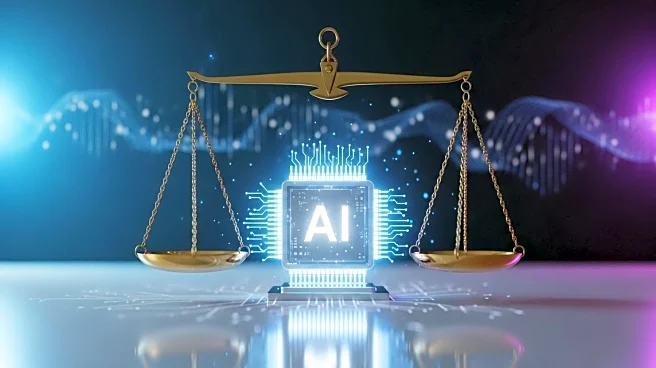What's Happening?
Anthropic, an artificial intelligence startup, has agreed to a settlement of at least $1.5 billion in a significant copyright lawsuit. The lawsuit accused the company of illegally downloading millions of pirated books to train its language models. This settlement is one of the largest publicly reported copyright recoveries. The agreement was reached with 7 million authors who claimed their works were used without permission to develop Anthropic's AI chatbot, Claude. This case highlights the legal and ethical challenges AI companies face when utilizing copyrighted materials.
Why It's Important?
The settlement underscores the growing legal scrutiny and ethical challenges faced by AI companies in the use of copyrighted content. As AI technology advances, the reliance on vast datasets, often sourced from copyrighted materials, raises significant legal and ethical questions. This case could set a precedent for future legal actions against AI companies, potentially impacting how they source and use data. Authors and content creators stand to gain from this settlement, as it acknowledges their rights and the value of their intellectual property. Conversely, AI companies may face increased legal risks and costs, prompting a reevaluation of their data acquisition strategies.
What's Next?
Following this settlement, AI companies may need to adopt more stringent measures to ensure compliance with copyright laws. This could involve developing new methods for data acquisition that respect intellectual property rights or negotiating licenses with content creators. The case may also prompt legislative bodies to consider new regulations governing the use of copyrighted materials in AI development. Stakeholders in the AI industry, including developers, legal experts, and policymakers, will likely engage in discussions to address these challenges and establish clearer guidelines.
Beyond the Headlines
This settlement may influence the broader conversation about the ethical use of data in AI development. It raises questions about the balance between innovation and intellectual property rights, potentially leading to a shift in how AI companies approach data ethics. The case could also inspire similar lawsuits from other content creators, further shaping the legal landscape for AI technologies.









